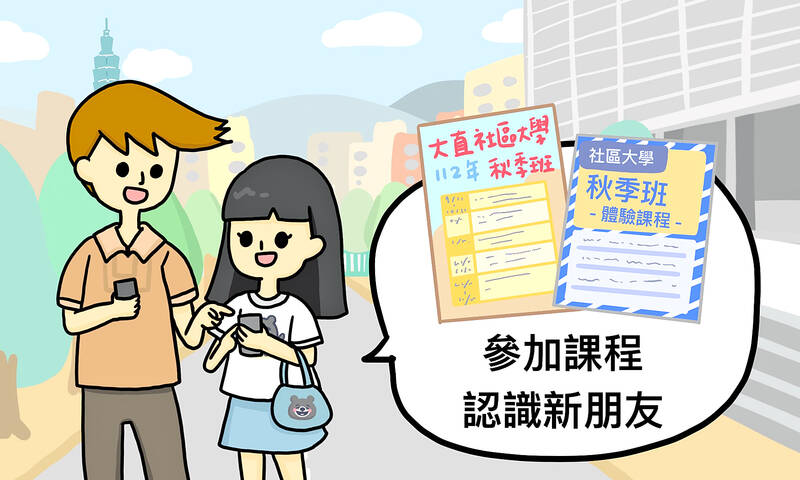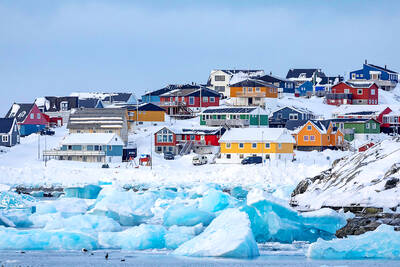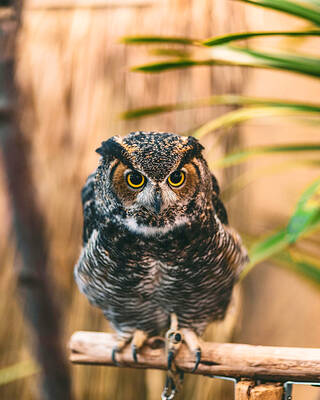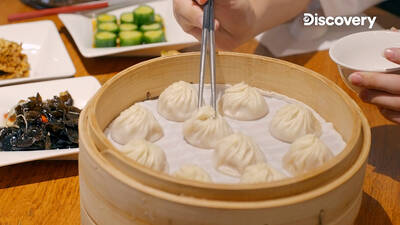對話 Dialogue
馬克:小實,我想問問你,你都是怎麼認識新朋友的?
Mǎkè:Xiǎoshí, wǒ xiǎng wèn wèn nǐ, nǐ dōu shì zěnme rènshì xīn péngyǒu de?

小實:怎麼突然這麼問?我記得你在臺灣的朋友很多啊!
Xiǎoshí:Zěnme túrán zhème wèn? Wǒ jìde nǐ zài Táiwān de péngyǒu hěnduō a!
馬克:是沒錯啊,只是我還想多認識一些臺灣人。
Mǎkè:Shì méicuò a, zhǐshì wǒ hái xiǎng duō rènshì yìxiē Táiwānrén.
小實:嗯……你試過現在很流行的網路交友嗎?
Xiǎoshí:En ... nǐ shìguò xiànzài hěn liúxíng de wǎnglù jiāoyǒu ma?
馬克:我試過,但是每次見到網友都覺得和網路上的感覺不一樣。
Mǎkè:Wǒ shìguò, dànshì měi cì jiàndào wǎngyǒu dōu juéde hàn wǎnglù shàng de gǎnjué bù yíyàng.
小實:這樣啊……還是你有興趣參加社區裡的課程嗎?
Xiǎoshí:Zhèyàng a... háishì nǐ yǒu xìngqù cānjiā shèqū lǐ de kèchéng ma?
馬克:喔?我看過一些廣告,好像有運動、藝術的各種主題?
Mǎkè:Ō ? Wǒ kànguò yìxiē guǎnggào, hǎoxiàng yǒu yùndòng, yìshù de gèzhǒng zhǔtí?
小實:是啊,你可以一邊學習新知識,一邊認識新朋友。
Xiǎoshí:Shì a, nǐ kěyǐ yìbiān xuéxí xīn zhīshì, yìbiān rènshi xīn péngyǒu.
馬克:聽起來很不錯耶,我去找找我們那個社區的課程。
Mǎkè:Tīngqǐlái hěn búcuò yé, wǒ qù zhǎo zhǎo wǒmen nàge shèqū de kèchéng.
小實:好的,祝你順利交到更多臺灣朋友喔!
Xiǎoshí:Hǎo de, zhù nǐ shùnlì jiāo dào gèngduō Táiwān péngyǒu ō!
翻譯 Translation
Mark: Xiaoshi, I want to ask you, how do you usually make new friends?
Xiaoshi: Why are you suddenly asking this? I remember you have a lot of friends in Taiwan!
Mark: That’s true, but I would like to meet more Taiwanese.
Xiaoshi: Hmm... Have you tried the popular trend of making friends online?
Mark: I have, but every time I meet someone on the Internet, it feels different than meeting in person.
Xiaoshi: I see... Are you interested in joining community courses?
Mark: Oh? I’ve seen some ads for those, like various themes such as sports and art?
Xiaoshi: Yes, you can learn new things while getting to know new people.
Mark: That sounds great. I’ll look for courses in our community.
Xiaoshi: Alright, I hope you get to make more friends!
單字片語 Vocabulary
1. 突然 (túrán) suddenly
2. 流行 (liúxíng) popularity
3. 交友 (jiāoyǒu) to make friends
4. 網友 (wǎngyǒu) netizen
5. 社區 (shèqū) community
6. 藝術 (yìshù) art
7. 主題 (zhǔtí) theme
8. 知識 (zhīshì) knowledge
9. 課程 (kèchéng) course
教材音檔 Audio Files
教材影片 Video Files:
https://www.instagram.com/celc.nou_tw/guide/_/17999106352646292/
實踐大學華語中心提供
By Shih Chien University Chinese Language Center: https://chineseusc.com/

US President Donald Trump has renewed his ambition to take control of Greenland for national security reasons and questioned whether Denmark has any legal right to the Arctic island. The debate has revived scrutiny of how Greenland became part of Denmark, its current self-rule and path to independence, and Washington’s military footprint. HOW DID DENMARK GET GREENLAND? Greenland was inhabited by Inuit peoples from Asia and North America intermittently from around 2,500 BC. Around 985 AD, Vikings led by Erik the Red settled in southern Greenland, farming and building churches. Around the same time, ancestors of today’s Inuit arrived, living as hunters

Owls have long fascinated people with their distinctive appearance and mysterious habits. These nocturnal birds possess large, round eyes and a flat facial disc. Their feathers come in shades of brown, gray, or white, helping them blend easily into the darkness. The most remarkable trait of owls is that they can turn their heads without damaging blood vessels. Contrary to popular belief, they can only rotate their heads up to 270 degrees, not 360 degrees. Owls have 14 cervical vertebrae, which is twice as many as humans. This special physical structure compensates for their inability to move their eyes within their

AI-generated summaries are shaking up the media world. Tools like Google’s AI Overviews now provide users with direct answers above the search results, resulting in fewer people clicking on news links. For publishers who rely on that traffic to generate advertising revenue, this shift is hitting hard. The fallout is measurable. Many sites have seen a sharp drop in traffic since AI summary features rolled out. An analysis revealed that a news outlet that had once ranked first on Google lost up to 79% of its traffic when its link appeared beneath an AI-generated summary. Statistics also show that

A: Bloomberg just released its annual travel guide, titled “25 Best Places to Travel in 2026.” What were the best Asian destinations? B: There were actually six Asian hotspots: Taiwan’s Taipei, Malaysia’s Penang, Kazakhstan’s Almaty, Indonesia’s Rote Island, India’s Tiger Reserves, and Oman. A: With its mix of traditional food and modern cuisine, Taipei has become a rising food capital in Asia. B: As Bloomberg reported, “Taiwan is a place that bubbles up in culinary conversation because of its famed beverage, bubble tea, and its early adoption of modern night markets.” A: And Din Tai Fung has now